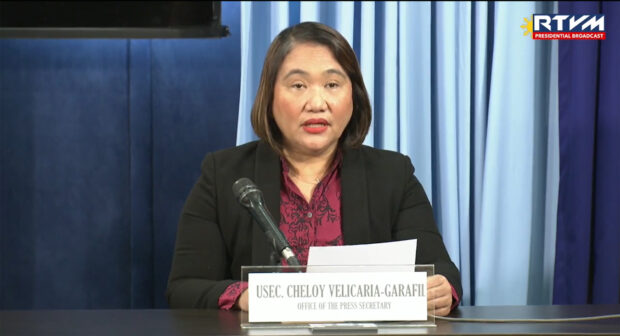
Presidential Communications Office Secretary Cheloy Velicaria-Garafil | PHOTO: PCO official website
President Marcos did not veto the P449.5-billion increase in the unprogrammed appropriations, which were inserted by some members of the congressional bicameral conference committee that finalized the P5.768-trillion national budget for 2024.
In a press statement on Friday, Presidential Communications Secretary Cheloy Velicaria-Garafil cited only two budget items vetoed by the President—a revolving fund of the Department of Justice (DOJ) and one item pertaining to the implementation of the National Government’s Career Executive Service Development Program (NGCESDP).
The President said in his veto message that his constitutional mandate to faithfully execute the laws of the land had “obliged” him to veto “Special Provision No. 1, ‘DOJ Revolving Fund,’ Volume I-A, page 1119” because “there is no law which authorizes the DOJ to establish a revolving fund for the purpose indicated therein.”
The revolving fund was to have come from service fees to be imposed on complaints and affidavits filed with the National Prosecution Service and petitions for review filed in the DOJ.
‘Inappropriate’
Mr. Marcos explained that the fees to be collected were “clearly not from business-type activities” covered by the General Provision on Revolving Funds in the General Appropriations Act (GAA), or the national budget, which allowed the creation of a revolving fund from receipts derived from “business-type activities” to be used for operational expenses of such activities.
Garafil did not specify the amount or the potential total fees that had been vetoed by the President.
Citing a Supreme Court ruling, the President said that “inappropriate provisions” were unconstitutional provisions.
“Because clearly these kind[s] of laws have no place in an appropriations bill,” he said. These are matters of general legislation more appropriately dealt with in separate enactments, he added.
Mr. Marcos also vetoed Section 38 under the General Provisions on the implementation of the NGCESDP because it “does not relate to any particular appropriation” in the 2024 budget.
He pointed out that Presidential Decree No. 336 already delineated the functions of the Career Executive Service Board (CESB) as the body in charge of the Career Executive Service (CES).
The Development Academy of the Philippines (DAP) is tasked with preparing the appropriate program necessary for the organization and operation of the CES, Mr. Marcos said. In consultation with the CESB, the DAP initiates and implements the CES program, he added.
As of Friday afternoon, Malacañang has not released the President’s full veto message for next year’s budget, which he signed during a ceremony on Wednesday afternoon.
Pimentel, Lacson
Garafil did not immediately respond to the Inquirer’s request for comment on why the President did not veto the unprogrammed appropriations, which were questioned by other lawmakers, particularly Senate Minority Leader Aquilino “Koko” Pimentel III.
The President did not mention the congressional insertions in his speech after he signed the budget law.
Last week, former Sen. Panfilo Lacson urged Mr. Marcos to veto the P449.5-billion increase in “unprogrammed appropriations” in the proposed 2024 budget, saying these were unconstitutional.
READ: Lacson urges Marcos: Veto unprogrammed budget ‘insertions’
Lacson, who had carefully scrutinized the national expenditure programs of previous administrations when he was senator, made the call after Pimentel revealed that the unprogrammed funds in the proposed budget increased to P731.4 billion from the original P281.9 billion after the bicameral conference committee meetings.
Pimentel said the additional appropriations were unconstitutional because Congress was prohibited from increasing the budget as proposed by the executive branch.
He said that with these additions, the national budget would amount to P6.218 trillion, more than what was initially sought by the administration.
The Constitution says that Congress may “maintain or reduce the [proposed] appropriations, but it cannot increase the appropriations,” according to Pimentel.
‘Triggers’
But Budget Secretary Amenah Pangandaman disagreed.
Unprogrammed funds “have triggers” and they could only be released “if you have additional revenues,” she told reporters at Malacañang following Wednesday’s budget signing.
“So, I don’t think it is [unconstitutional]. And I think that is also the stand of BBM (Bongbong Marcos), and some of the members of the House and the Senate,” she said.
The budget chief said there were no “direct vetoes” from the President in the 2024 GAA.
In a separate interview also on Wednesday, Senate President Juan Miguel Zubiri said next year’s budget would be a “responsive and progressive budget,” with large allocations given to social services, emergency response and defense programs.
Zubiri also assured Filipinos that there were no confidential and intelligence funds allocated to civilian agencies. —WITH A REPORT FROM INQUIRER RESEARCH